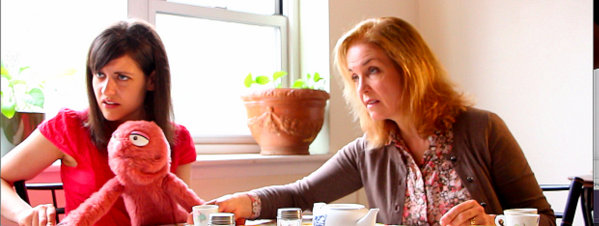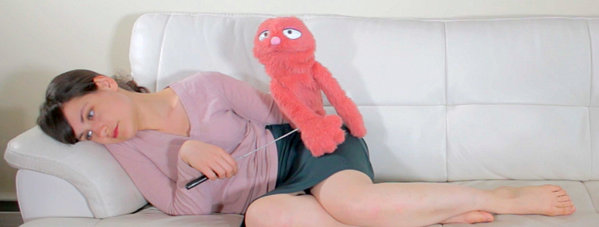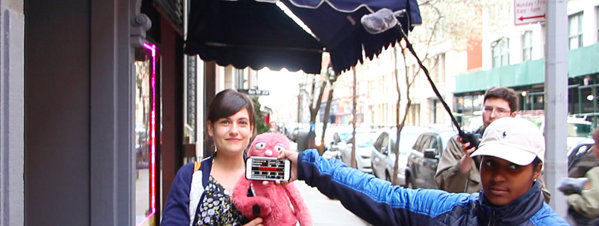
Hi, I am Nicola Rose. I started producing and directing at age 22, puppeteering at 21, acting at 10 and writing at probably about age 3. I started out in theater but lately I have migrated toward film. I got my bachelor’s degree from Columbia University, from where I traveled to Paris, France to study puppetry. I returned to Paris a couple of years later to get my master’s in theater studies at the Sorbonne-Nouvelle. I now live in New York City, where I produce, direct, act and fend off the attacks of a marauding cat.
#callieandizzy get interviewed by @reuters @ #NYCC #webseries #nycc2016 #carmensandiego #puppeteer #reutersnyc pic.twitter.com/Co7XXwz05x
— Callie & Izzy Series (@callieandizzy) October 9, 2016
Describe your career
My latest project (as a producer and performer) is the comedy series, Callie & Izzy, which concerns a girl with a rare disease called Puppetitis B, and which I exhort you to watch here, now, right now, WHY AREN’T YOU WATCHING IT ALREADY. My next project is a bilingual short film, Creative Block, shot in both France and the U.S. After that I’ve said I want to write about desserts, and I’m sticking to it.
Why did you become an actor
I really have no idea. Maybe because my theatre camp got to take a field trip to the water park? But I think it’s more that as a child, I basically couldn’t obey the rules of anything, which made acting an obvious professional choice. This kind of disposition won’t serve you nearly as well in, say, heart surgery (“Say! I think I’ll carve his chest into the shape of a bunny!”)
How did you arrive at the decision to be a puppeteer
When I first went to Paris, I studied the history of puppetry in France by apprenticing and interning with several French puppeteers. The study project ended up being more practical than theoretical – thank goodness. I guess I made the decision at some point during that stay, but honestly, I don’t remember it. I came back to the U.S. and the next thing I did was produce a highly inappropriate puppet show at college.
What acting books do you read
I like books by artists that tell about the evolution of a project, whether it’s the (internal) creation of a character or the production of a film. But I also prefer not to limit myself to books about my own field. I like reading stuff by graphic artists, musicians, athletes, etc., just as much. If anything, I find this more stimulating than reading about acting, because reading about other disciplines gets you thinking about your own work more critically and from new angles.
- The Wes Anderson Collection by Matt Zoller Seitz
- Imagination Illustrated: The Jim Henson Journal by Karen Falk
- Young Charlotte: Filmmaker by Frank Viva (this is a children’s book that has a lot to say about creating your own work and doing it well)
Nicola Rose Actor Reel from Nicola McEldowney on Vimeo.
What does being a puppeteer and actor have in common
When you are an actor you play a character from your own body, and when you are a puppeteer you play that character from your hand. (The advantage is clearly the latter because if you suck you can blame the actor on your hand.)
How do you prepare for a role, as a puppeteer or actor
Well, the words come first and these days I truly have to drill them into my mind. I’m a bit resentful of that actually! As a child or teenager, I never had to give any thought to memorizing – I would just sponge the words up and there they were. These days I have to memorize by rote and associate the lines to something, which usually means I rehearse them to myself while at the gym. Immediately before performing or going on set as a producer I sometimes also power myself up by listening to an eclectic bunch of music. What do I mean by eclectic? You should see my monthly Spotify playlists. I pick whatever random songs come up from my general list that strike my fancy. Last month’s list ranges from Brahms, Prokofiev, Ravel and Percy Grainger to The Swingle Singers, Billy Joel and Death Cab for Cutie. I can’t really explain.
How do you build a character from a script? Or how do you create a character be it a person or a puppet? Do you actually use tools to build the puppet you work with?
It all comes back to the text again; the more I read it, the more a very particular person starts to evolve in my mind. It may not be the characterization the author envisioned but you do have to follow your own instincts to a great degree.
I do build my own puppets sometimes, but I’m not a professional builder. I prefer to buy puppets made by very talented colleagues such as Karen Trask, David Manley and FurriFingers and use those!
How do you stay fresh on a production
Simple: think of your work from the point of view of the audience. They don’t know the fatigue or aggravation you may have accrued from doing a part or a take many times. Play it as though it’s the first time, because for your viewer, it is.
Explain how you make creative choices for your characters when you are in production.
Let the character guide your instincts and you won’t go wrong. Stay in touch with your gut, because if the gut says your character would laugh or get angry or whatever, chances are the gut is right. In my experience, over thinking doesn’t pay. This may be painfully evident to my friends.
What do you want most from a director during production
To work with the actor’s natural impulses and eccentricities, promoting an environment in which the actor leads the way in creating a character.
What actors or puppet do you want to work with most
Here’s the ideal: Audrey Tautou would play my sister and we would travel the world in search of a priceless stolen propeller beanie in a delightfully madcap epic directed by Wes Anderson, with art direction by the late Tove Jansson and score by They Might Be Giants.
What acting technique do you use
Like many storied actors before me, such as John Gielgud and the person who played the pink Power Ranger, I use the following 6-step technique:
- Center self.
- Fill lungs with deep, cleansing, powerful breath.
- Yell real hard at cat to stop tearing posters off your wall.
- Pull cat off wall.
- Dress wounds and return to powerful act of artistic creation until next tearing sound is heard .000005 seconds later.
- Repeat.
What advice would you give to actors
If you find yourself taking yourself seriously, it is time to switch careers









